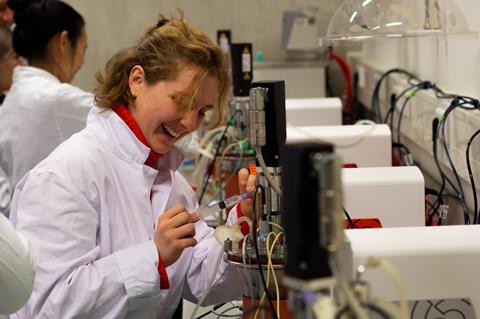In the Netherlands, big steps are already taken in terms of the protein transition and precision fermentation. However, education is needed to ensure these major developments can continue. The English courses offered by Wageningen University & Research are a good start. ‘Training people to lead the field is important.’
Developments are surrounding the transition to alternative proteins. These include lab-grown burgers, as well as chicken, fish and cheese. Or single lab-made proteins. Meanwhile, almost nothing is unthinkable in terms of the production process. Many of these products originate from cellular agriculture or precision fermentation. There is still much to learn and discover in these areas. Therefore, education around these topics is crucial. ‘We really want to put the Netherlands on the map with cellular agriculture evolution,’ says Mark Bisschops, an associate professor at Wageningen University & Research (WUR).
Since the start of this academic year, WUR has offered courses teaching students about topics like the protein transition. This education is linked to research subjects at Maastricht University and TU Delft. The SVO vocational programme in Food is also working on the ‘Plant(w)aardig diet’, while at the ZUYD University of Applied Sciences’ Chemelot campus, students are getting to work with bioprinting.
Bisschops, who co-designed the courses on protein transition, explains exactly what the education involves: ‘Precision fermentation has a long history, from which companies like Vivici have emerged. It’s great that we can conduct research, but of course we also need to train people who can start working in this field and really drive it forward.’ That is why it is important to have education that focuses on the development of students in this arising field.
At WUR, there are currently three different courses taught in English: Precision Fermentation; Cultivated Meat and Seafood Production; and Becoming Food: Cellular Agriculture Beyond the Lab’. These courses focus on the theory behind protein development and cell isolation. ‘The central question for the latter is how we envision the food of the future,’ says Bisschops. Besides the theoretical subjects, there is also an opportunity to consider the protein transition from a philosophical perspective for students with the course Becoming Food.
These subjects are being offered for the first time this year. ‘You can see that the students are really interested in the subject and take initiative.’ Students have provided a lot of feedback on how to make adjustments and improvements in the course for the future.

Above all, the courses offer many enjoyable opportunities. Students get to work on their own protein and with a bioreactor, as well as setting up a project that covers all aspects of a protein product. ‘For instance, one group came up with the idea of producing whale meat to reduce whaling,’ Bisschops continues. ‘But how do you get a whaler to start working with a bioreactor? What would the consequences be?’ Students also investigated the use of lactoglobulin as a base for whipped cream. With this end product, different properties are desired than for feta-like cheese for example.
For now, these courses are only available at WUR and to a limited group. However, Bisschops points out: ‘The idea is that, eventually, the modules or the courses themselves will also be available in places like Maastricht or Delft.’













Nog geen opmerkingen